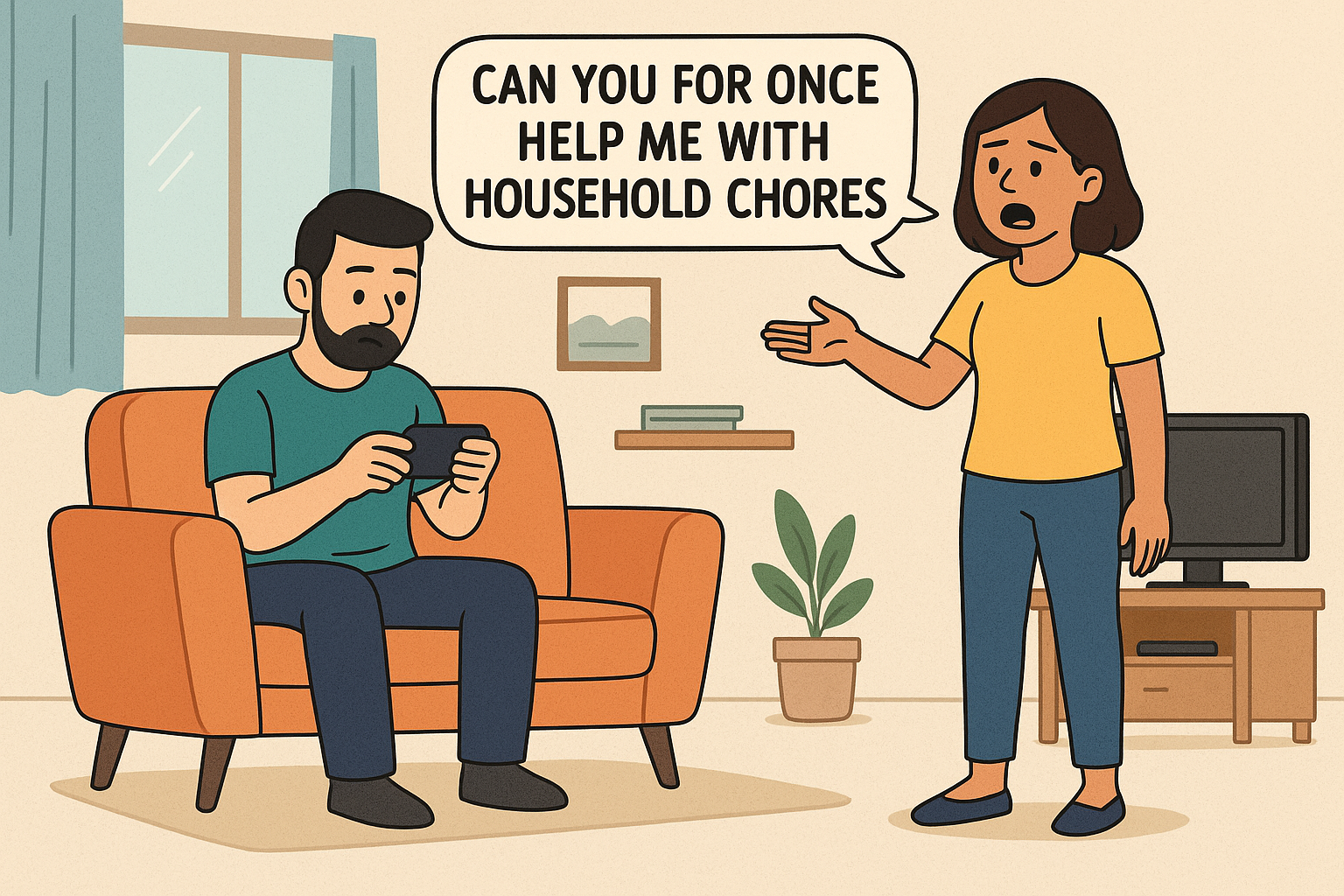When one is
constantly taking charge, and the other deflects or avoids emotional labor, the
relationship slips from “adult-adult” to “parent-child” dynamics. This hidden
imbalance doesn’t just create frustration—it leads to emotional burnout,
resentment, and disconnection.
This article
explores what it feels like to become the “parent” in a marriage, how it
quietly chips away at your well-being, and how therapy can help restore
equality and emotional intimacy.
In psychological
terms, relationships thrive when both partners interact as
“adults”—communicating clearly, managing emotions, and taking shared
responsibility. However, when one partner consistently takes charge of
everything—emotions, schedules, finances, and decisions—they may start to
unconsciously adopt the “parent” role, while the other assumes a “child”
position: passive, dependent, or emotionally unavailable.
This dynamic often
looks like:
- One partner constantly reminding or
instructing the other.
- Emotional labor being managed by only
one person.
- One person feeling burdened while the
other seems carefree or oblivious.
Example Conversation (Parent-Child
Dynamic):
Partner A (Parent role):
“Did you pay the electricity bill like I asked three times this week?”
Partner B (Child role):
“Oh, I forgot again. Can’t you just handle it? You’re better at these things
anyway.”
Over time, such interactions create
exhaustion and resentment in the “parent” partner, who feels they are holding
the marriage together alone.
Signs You're the
Parent in Your Marriage
Being the “parent”
in a relationship may not be obvious at first, especially in cultures where
caregiving is often gendered or normalized. But if you notice the following
signs, you might be stuck in this emotionally draining role:
- You have to remind, nag,
or follow up on basic responsibilities.
- You manage your partner’s schedule,
feelings, and decision-making.
- You feel more like a caretaker
or therapist than a partner.
- You rarely get to express your own
vulnerabilities or be cared for.
- You're constantly emotionally
regulating the relationship.
This dynamic can
initially feel productive—"someone has to take charge"—but over time,
it breeds emotional fatigue and power imbalance.
Emotional and
Mental Burnout: The Hidden Cost
Becoming the
parent in your marriage can feel invisible. You're doing so much, but receiving
little acknowledgment or support in return.
Emotional
consequences include:
- Resentment: “Why am I
the only one who cares about our future?”
- Loneliness: “I feel like
I’m doing life alone—even though I’m married.”
- Self-doubt: “Am I being
too controlling or are they just too passive?”
- Compassion fatigue: “I can’t
keep taking care of them emotionally. I’m drained.”
You may start to
feel emotionally neglected. Ironically, while you appear strong and capable on
the outside, inside you may feel unseen, overwhelmed, and even depressed.
Let’s break it
down further with contrasting conversations.
Adult-Adult
Interaction:
Partner A:
“I’m feeling overwhelmed managing the finances and our social calendar. Can we
sit together this weekend to divide the tasks?”
Partner B:
“Absolutely. I didn’t realize you were carrying so much. Let’s figure it out
together.”
Parent-Child Interaction:
Partner A:
“You said you’d book the plumber and never did. Now the leak is worse!”
Partner B:
“Why are you always on my case? You’re acting like my mother.”
In the first
example, both partners are emotionally mature and responsive. In the second,
Partner A is managing practical issues and emotions, while Partner B
avoids accountability and reacts defensively—mirroring a child being scolded.
Why Do We Slip
Into Parent-Child Roles?
It usually starts
small—one partner forgets things, avoids tough conversations, or struggles with
responsibility. The other steps in to keep things running. Over time, it
becomes a pattern.
- Childhood Roles: We often
repeat the roles we grew up with. If you were the caretaker as a child,
you might play that role again in your marriage.
- Uneven Emotional Maturity: One partner
may be better at handling emotions or responsibilities, so they naturally
take over.
- Avoidance: Some people
avoid adult tasks—emotionally or practically—and rely on their partner to
carry the weight.
- Cultural Conditioning: In many
households, especially in Indian culture, one partner (often the woman) is
expected to “manage everything.”
What starts as
helping soon feels like parenting—and that’s where the imbalance begins.
The Therapy
Perspective: How Couples Can Heal
Therapy provides a
safe space to understand these roles and re-balance the relationship. A
therapist can help partners:
- Identify dysfunctional patterns without
blame.
- Explore family-of-origin influences shaping
their behavior.
- Build accountability through
adult-adult communication.
- Share emotional labor in ways that
feel fair and respectful.
For the “parent”
partner, therapy offers a place to express built-up frustration, grief, or
loneliness without guilt. For the “child” partner, it can be an awakening to
how their passivity impacts the relationship.
Rebuilding
Balance: What You Can Do
If you’ve
recognized this dynamic in your own marriage, here’s where you can start:
- Name
the Pattern Without Blame
Use “I” statements:
“I feel overwhelmed carrying most of the emotional and practical load. Can we talk about how we divide things?” - Set
Boundaries Around Emotional Labor
Decide what responsibilities you’ll no longer over-function on. Let your partner experience the consequences (e.g., a late bill) to create natural accountability. - Invite
Mutual Problem-Solving
Encourage adult-adult dialogues:
“How can we handle this together?” instead of “Why didn’t you do this again?” - Stop
Playing the Fixer Role
It’s tempting to just do everything yourself, but it reinforces the imbalance. Step back. Trust your partner to rise up—even if it’s uncomfortable initially. - Seek
Couples Therapy Early
Don’t wait until burnout turns into bitterness. A therapist can help reframe your relationship as a partnership, not a power struggling

